The Goat or, Who is Sylvia?
By Edward Albee
Directed by James Bohnen
Produced by Remy Bumppo
At the Greenhouse Theater Center
What, then, would be the origin of tragedy? Perhaps joy, strength, overflowing health, overgreat fullness?
– Friedrich Nietzsche
Not to get all Gonzo or anything, but I’ve been staring at this blank sheet – screen, I guess – for fifteen minutes and have no idea what to write. How to start, I suppose. Which is not to say there isn’t a lot to report . . . it just seems almost cheap, somehow wrong, to sum up last night’s performance with mere words. It seems insufficient to recount, in any way, what happened without having your hands wrapped around the neck of the person you’re explaining it to.
Which actually sums up The Goat or, Who is Sylvia? (Notes toward a definition of tragedy) not too badly. Watching this play is like watching a public hanging, where all of the crimes are recounted, and you can see them happening in front of you. Or maybe it’s more like watching a Satyr song . . . .
The Goat, as so many of Albee’s plays, as so much of the great American oeuvre, is a family drama. And yet, in a way, it’s beyond that; it’s not really a family, it’s not really people on stage, it’s more profound, more primordial than that. The subtitle, “Notes toward a definition of tragedy,” that would be a clue. It really is, in a way, a retooling of Greek tragedy. True, there are no kings on stage, no princes – but noblemen, sure: Martin (the infallible Nick Sandys) is at the top of his professional field; he is a paragon among architects, who, at the ripe age of 50, has been awarded a $2 billion project, and is the youngest recipient of architecture’s version of the Nobel. He is magnanimous, loving, an archetypical husband and father. But, because of one single action – an action that seems fated – he falls. He is our Oidipous Tyrannos. It just so happens that one action is fucking a goat. (By the way, if you’re uncomfortable with that sort of language . . . well, if you want to see great theatre, get used to being uncomfortable.) Martin’s wife, Stevie (Annabel Armour, in a role of truly Grecian proportions), is similarly archetypal: their son, Billy (Will Allan, who does wonderfully with, in a certain way, the most difficult role of the play), even says that he could not ask for, could not possibly conceive of, better parents than the two of them. And he is a perfect child – apart from the fact that he’s gay. That is to say, he is a well-behaved teenager, one that causes neither himself nor his parents any grief (beyond the psychological anguish a father feels for the fact that his bloodline ends with his son).
His bloodline ends with his son – there we have another trope of Greek Tragedy, the Cursed Family; Cadmus, for instance, from whose loins sprout much of the great tragedies surviving today, for he counts Pentheus, Semele, and Oedipus amongst his heirs. Indeed, his family gave birth to tragedy, for Semele gave birth to Dionysus, in whose honor the first tragedies were performed.
Albee clearly is redefining tragedy for our own times, or at least experimenting with a new definition, even when he uses absurd elements in the plot. Indeed, perhaps the absurdity lends more of a Greek flair: for few of the tragedies do not have some semblance of the absurd in them. And it’s no coincidence that The Goat contains the three elements of Aristotelian tragedy: peripeteia, recognition and discovery, and pathos. Albee worked by the book when he wrote this. And the catharsis the audience feels at the end of the play is palpable. In truth, there are a string of little catharses throughout the play – gallows humor, little pinpricks of light that, because everything around them is so dark, shine all the brighter, allow the audience some small release of the great tension building within them. But these clever quasi-catharses do not lessen or overshadow the Oidipoiean ending.
This is great theatre. There is no way around it, no other word for it. Every single actor on stage is at the top of their game, and their game is tops. The set is beautiful, the space intimate – exactly what this kind of show needs, this small, personal kind of show that would get lost and depleted the larger the space got – the direction, casting, staging . . . all as good as you’re likely to see anywhere.
I have not mentioned the fourth actor, Michael Joseph Mitchell, who plays Ross; as one may see, I got sidetracked by the idea of the cursed family. It was only my oversight, I assure you, because he is no lesser – and no greater – than anyone else on stage. The scene between Ross and Martin is truly wonderful: the innocent joy of old friends. There is nothing about this production that blemishes it. It is truly a masterful work, masterfully done.
Highly Recommended
Will Fink
Reviewed on 4.4.11
For full show information, visit The Goat’s page at TheatreinChicago.
At the Greenhouse Theater Center, 2257 N. Lincoln Ave., Chicago, IL; call 773-404-7336 or visit www.remybumppo.org; performances Wednesday through Saturday at 7:30, Sunday at 2:30; tickets $30-$45; running time 1 hour 40 minutes without intermission; through May 8th.

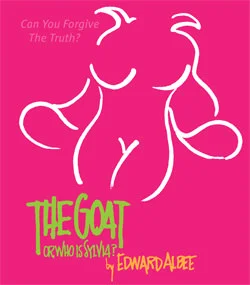
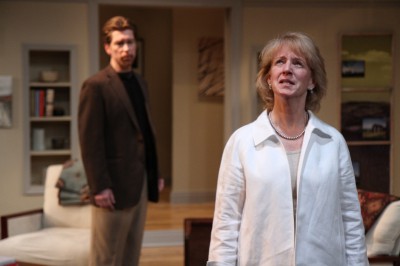
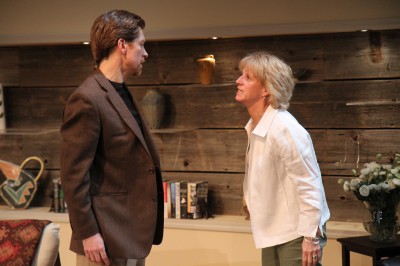
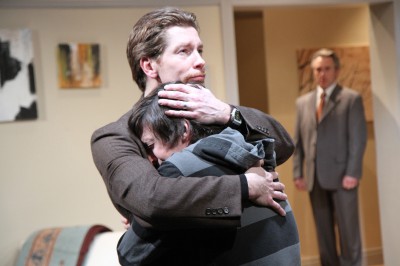
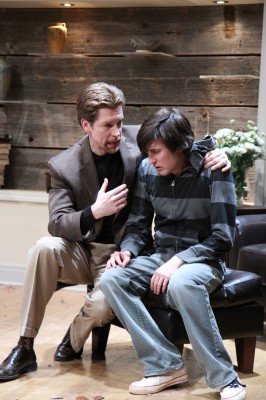
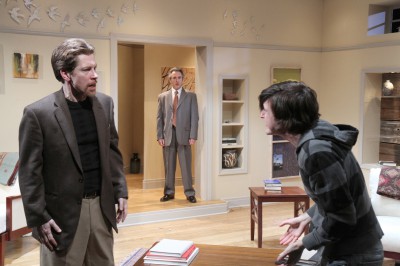
So you wrote a book report instead of a review, then ran out of space.